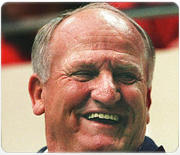Difference between revisions of "LaVell Edwards"
Dennisangot (talk | contribs) |
|||
| Line 1: | Line 1: | ||
| − | [[Image:LaVell_Edwards.jpg|left| | + | [[Image:LaVell_Edwards.jpg|left|200px|alt=Mormon Football Coach LaVell Edwards|Mormon Football Coach LaVell Edwards]] |
'''LaVell Edwards''' was the head football coach at [[Brigham Young University]] from 1972 to 2000. He was born on October 11, 1930, in Orem, Utah. In 1984 he led BYU's football team to the number 1 spot in the BCS rankings, going 13-0 for the national championship. In 1984, he was named National Coach of the Year. Following the 1984 national championship, Edwards was offered the head coaching positions with the Detroit Lions as well as the University of Texas at Austin, which he declined. | '''LaVell Edwards''' was the head football coach at [[Brigham Young University]] from 1972 to 2000. He was born on October 11, 1930, in Orem, Utah. In 1984 he led BYU's football team to the number 1 spot in the BCS rankings, going 13-0 for the national championship. In 1984, he was named National Coach of the Year. Following the 1984 national championship, Edwards was offered the head coaching positions with the Detroit Lions as well as the University of Texas at Austin, which he declined. | ||
Revision as of 23:03, 3 October 2010
LaVell Edwards was the head football coach at Brigham Young University from 1972 to 2000. He was born on October 11, 1930, in Orem, Utah. In 1984 he led BYU's football team to the number 1 spot in the BCS rankings, going 13-0 for the national championship. In 1984, he was named National Coach of the Year. Following the 1984 national championship, Edwards was offered the head coaching positions with the Detroit Lions as well as the University of Texas at Austin, which he declined.
He is considered the founder of the spread formation passing attack, and one of the most influential and innovative minds in college football history. His career wins/losses are 257-101-3. He started coaching in an era when college football offenses were dominated by strong running attacks, but his style was passing-dominated. All-star quarterbacks flourished under his leadership — Gary Scheide, Gifford Nielsen, Marc Wilson, Jim McMahon, Steve Young, Robbie Bosco, Ty Detmer, Steve Sarkisian, and Brandon Doman. His quarterbacks threw over 11,000 passes for more than 100,000 yards and 635 touchdowns.
Prior to Edwards' final game, the football stadium at Brigham Young University was renamed LaVell Edwards Stadium in his honor (it was formerly Cougar Stadium). At the time of his retirement, he ranked sixth in all-time victories. Edwards received the Amos Alonzo Stagg Award, presented by the American Football Coaches Association, in 2003.
Prior to coaching for BYU, Edwards played football for Utah State University and earned a Masters degree at the University of Utah. While head football coach at BYU, Edwards also earned a doctorate. He and his wife served an 18-month mission for The Church of Jesus Christ of Latter-day Saints in New York City during 2002–2003.
In 2009 the National College Football Awards Association announced that legendary BYU football coach LaVell Edwards is the 2009 recipient of the NCFAA Contributions to College Football Award.
Currently, Lavell serves as a National Advisor to ASCEND: A Humanitarian Alliance. This non-profit organization plans expeditions to African and South American countries to provide life skills mentoring with sustainable solutions in education, enterprise, health and simple technology.
- For more about Coach Edwards, go to Wikipedia.org.
